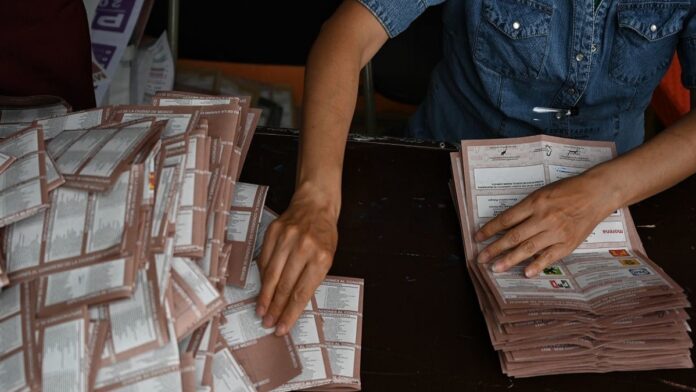
Mexico’s Senate on Wednesday night approved controversial changes to the nation’s electoral agency, the National Electoral Institute (INE), pushed by President Andrés Manuel López Obrador. The changes — dubbed “Plan B” because opposition lawmakers blocked López Obrador’s party from enshrining more sweeping changes in the Constitution last year — will cut the agency’s size, diminish its autonomy, and weaken its power to punish election law violations.
The Senate passed the reforms 72-50, and López Obrador is expected to sign them into law. Opposition lawmakers say they will then immediately challenge it at the Supreme Court. Protest marches are planned.
Critics, including some allies of López Obrador, call the measures an unconstitutional effort to weaken the independent electoral body responsible for breaking the 71-year run of single-party rule but the PRI in 2000. Mexico is holding presidential elections in 2024, and opposition lawmakers held up signs Wednesday reading, “Morena wants to steal the elections,” referring to López Obrador’s party.
Other observers warn that López Obrador has also been critical of the judiciary and amassed power in the military, among other authoritarian tendencies. It isn’t clear if Mexico’s democratic institutions are rooted enough to withstand presidential interference.
Mexico’s president insists he isn’t weakening electoral oversight but trying to balance the budget and curb the privileges of the INE, which he has long complained is controlled by the elites. “We were looking to save money, without affecting the work of the INE,” presidential spokesman Jesús Ramírez Cuevas told The New York Times, adding that López Obrador would prefer to spend limited public money on “social investments, in health, education, and infrastructure.”
“What’s at play is whether we’re going to have a country with democratic institutions and the rule of law,” countered Jorge Alcocer Villanueva, a former interior ministry official under López Obrador. The president has been “resentful of the electoral authority” since he lost the 2006 election by 0.56 percent of the vote, Alcocer Villanueva added. “That resentment makes him act irrationally on this issue.”
Source.- El Financiero



